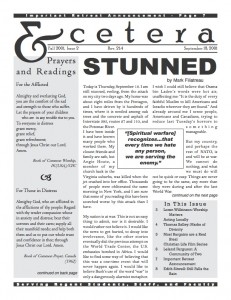
I was ready to write my second post about T.M. Luhrmann’s When God Talks Back when memories of this day intruded. September 11 is a complicated day for me. Here’s what I wrote back in 2007:
[On Sept. 11, 2001], I met Debbie Erickson on the way to our first Hebrew class of the year at Regent College. We were both biking down University Drive at about 7:30 am PST. “Have you heard?” Debbie asked me. By that time, both towers have come down. Because I had not turned on a TV or radio that morning, this is the first time I’ve heard about anything. We continue on to class.
That Tuesday was the first “real” day of class that semester. Tuesdays are the day for chapel and the massive communal meal simply called “Soup,” when about 300 members of the Regent community sing, pray, and worship together, then enjoy military-size pots of soup. That Tuesday was also the first official day of my role as editor of the school newspaper.
The day before, I had made my first trip to Copies Plus on West Broadway to drop off the PDF of the Regent College student newspaper, the Et Cetera. Over the summer, I had met with John Stackhouse, Maxine Hancock, the previous editor Won Jang, and my assistant editor Leland Ferguson to plan the coming year. I had also spent several hours in the Regent library reading student newspapers dating to the 1970s. Editing the Et Cetera fit perfectly with an idea I had been developing for my masters thesis —writing for a specific community. How could I have known that writing for the Regent community would have become so important that year?
The Christian, Academic Community
Regent College was a Christian community, so we responded to the event of September 11 with prayers, lament, and memorial services. Phil Long began our Hebrew class with a long prayer for the unfolding events, and impromptu groups gathered all day to pray.
But we were also an academic community. Over the following weeks and months, we responded to 9/11 with discussions about the role of lament psalms in Christian worship, roundtables about whether Christians should serve in the military, and readings of World War II poetry by W.H. Auden and Edith Sitwell.
Last year, I pulled out my copies of Et Cetera from both Sept. 11 and Sept. 18. As I expected, the disconnects between the events of September 11 and our instantly-outdated weekly were obvious, but even so, items like Won’s poem “Reciting the Undertones” struck an appropriate chord for the day. In the Sept. 18 issue, we led with a powerful meditation from my friend Mark Filiatreau and printed a number of prayers and poems, but we also published mundane items like invitations to a film discussion, a warning from our facilities manager about bicycle thieves, and logistical information for the annual retreat. There are also some strange resonances in these two issues —the announcement of a visiting scholar who I never met at Regent but later got to know through ESN and Faculty Ministry, the title of Regent’s 2001 retreat being one of Tom’s favorite phrases, “Head, Heart and Hands.”
A Day of Joy
In our home, though, September 11 is also a day of joy, because two years later, on 9/11/2003, our first daughter was born. Some years, the pain of 9/11 seems to be stronger or more visible in our culture, and we have to remember to temper our public celebrations of Agatha’s life. I’m glad that she was born on this day, because it’s a reminder that, on the darkest day in history, Good Friday, our salvation was won.
It’s also a day of absurdity for us, because as my wife Elizabeth recovered after giving birth, this video was replayed nonstop all day long on nearly every channel we watched.
Like I said, this is a complicated day for me, as I’m sure it is for many of you. That’s all of my thoughts about today, but perhaps you have some you’d like to share.
- How did your community, Christian and academic, respond to 9/11?
- What resources gave you comfort or strength?
- Has the day become complicated by other emotions as the years have passed? How do you express joy in the midst of mourning?
The former Associate Director for the Emerging Scholars Network, Micheal lives in Cincinnati with his wife and three children and works as a web manager for a national storage and organization company. He writes about work, vocation, and finding meaning in what you do at No Small Actors.

We watched the towers collapse from campus; our students started mentioning their missing loved ones; our Muslim students told their professors that they did not feel safe enough to come to class; the sound of sirens and jet fighters was incessant; the cloud of smoke was seared into our lungs and memories; and we had to go back into the classroom the following day.